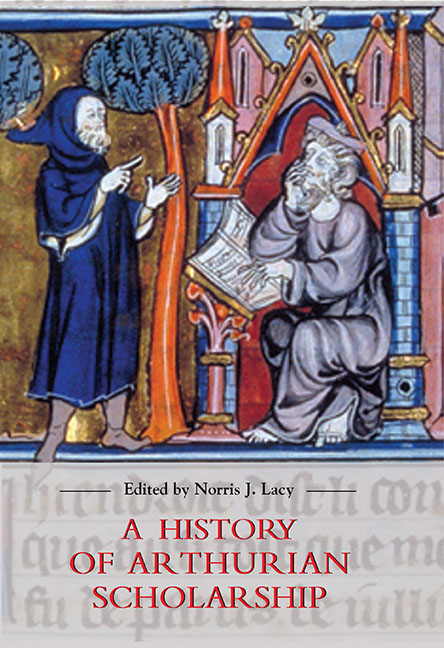German Arthurian Literature
Published online by Cambridge University Press: 18 March 2023
Summary
The emergence of medieval philology is intimately connected with German scholarship. Even the earliest researchers who showed interest in the Middle Ages, Johann Christoph Gottsched (1700–66), Johann Jakob Bodmer (1698–1783), and Gotthold Ephraim Lessing (1729–81), paid attention to Arthurian literature. Gottsched discussedWolfram von Eschenbach's Parzival, which he had read in a printed version from 1477, in his Kritische Dichtkunst (1730), summarizing, however, only the Gahmuret section, without considering any of the central parts of the romance. Bodmer anonymously published a versified version of Wolfram von Eschenbach's Parzival in 1753, and offered a paraphrased retelling of Hartmann von Aue's Iwein (Fabel von Laudine) in 1780 (critically edited by Karl Michaeler in 1786–87), followed by a modern German translation of Wolfram von Eschenbach's Parzival in 1781. Lessing, who was not only a famous dramatist and fable author, but also worked as a librarian in Wolfenbüttel, examined many different medieval texts, such as Hugo von Trimberg's Renner and Wolfram von Eschenbach's Parzival, and also commented about the Grail myth in a significant letter to his friend Johann Joachim Eschenburg on 21 October 1774, in which he compared the concept of the Grail with the ancient Greek idea of Ilion and discussed relevant aspects of the dissemination process of the Arthurian romance.
Bodmer's student Christoph Heinrich Myller published Wolfram's Parzival in its Middle High German original for the first time in 1784, and Gottfried von Straßburg's Tristan in 1785. Johann Gottfried Herder (1744–1803), famous for his enthusiasm for and extensive research on ancient folk culture worldwide, was also fascinated by the King Arthur myth. In his Ideen zu einer Philosophie zur Geschichte der Menschheit (1784–91) he located its origin in the Cymric (Welsh) culture as documented by the hundreds of town names associated with Arthur. But he specifically pointed toward Normandy, which had been under strong English influence, where the ‘fairy tale’ of this mythical king was first cast into its literary form and then spread across all of Europe.
According to Herder, the account of King Arthur was soon enriched with material from legendary tales originating in the Orient and from saints’ lives.
- Type
- Chapter
- Information
- A History of Arthurian Scholarship , pp. 122 - 139Publisher: Boydell & BrewerPrint publication year: 2006

